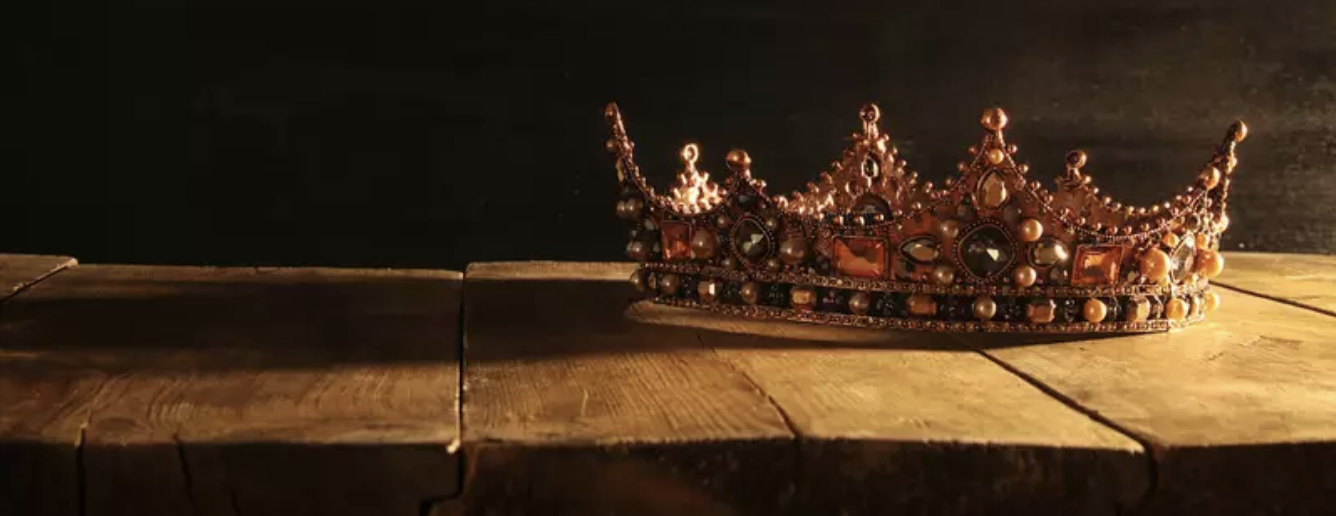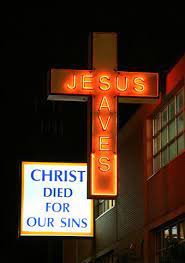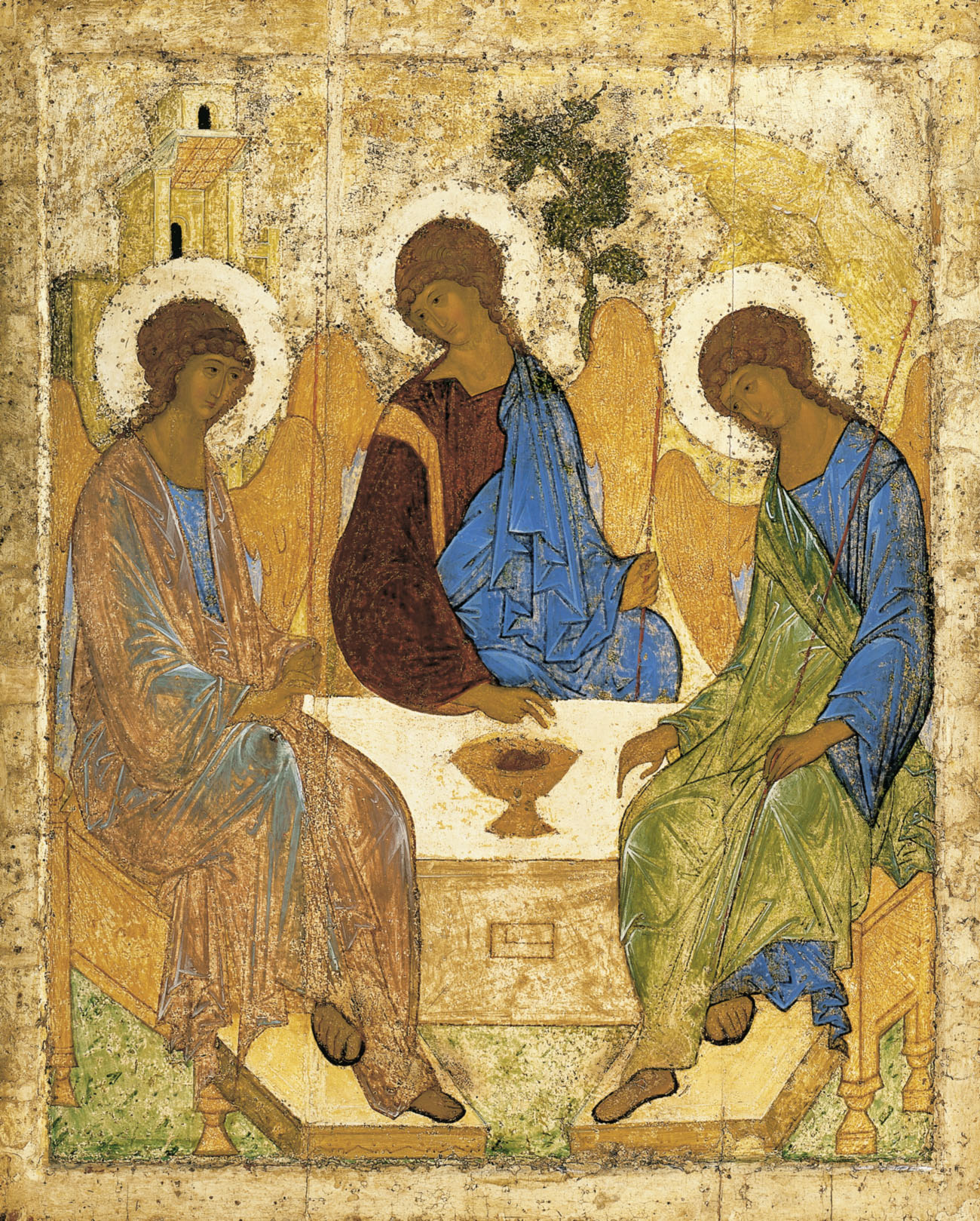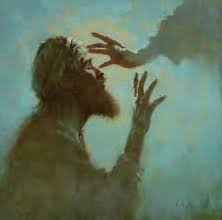
John 20:1-10 (Matins)
Romans 15:1-7
Matthew 9:27-35
The Immortal Kingdom
And their eyes were opened.
(Mt 9:30)
In the Name of the Father and of the Son and of the Holy Ghost. Amen.

If you walk down South State Street in Chicago tonight,
I suppose you will see a red neon sign, "Jesus Saves,"
three short syllables burning in the night.
Or
if you should go to a ballpark or watch a game on television,
you might see a big poster, "John 3:16,"
invoking a single sentence:
For God so loved the world, that He gave His only-begotten Son, that whosoever
believeth in Him should not perish, but have everlasting life.
(Jn 3:16)
|
These were the cultural bumper stickers
I grew up withy.
They painted a certain picture:
"Jesus saves.
God sent His Son to save us, to wash our feet, to serve us, ....
but not to be served."
The young, impressionable mind perceives that things are "on offer,"
like a big sign in a candy store window:
"Free Candy This Saturday."
Later,
I would hear this bumper sticker confirmed on radio programs
like "Unshackled"
or
in countless sermons broadcast on Evangelical radio.
The deeper story concerning God and the Son He sent into the world
is never to be heard
as if it were complicated theology that we can't get into just now.
But it is not that the deeper and truer sentences are difficult to understand.
The truth is,
any child could understant them.
They are simply not voiced.
You see,
I never heard that we were of noble lineage but had become lost,
perhaps in a shipwreck
—
no longer in bonds of affection with our royal ancestors, still living.
I never heard that our Father King had sent
the Heir
into the world because we had forgotten who we were.
He was alarmed.
The Early Fathers
—
Origen, St. Irenaeus, St. Athanasius, to name three
—
had explained all this and in terms anyone could understand.
The story is a vivid one,
no less gripping than any child's adventure story:
how we had forgotten our noble identities in a strange land,
how we had let animal nature gain the upper hand,
how we had morphed into brutish beasts,
how we had invited demons to dwell within us.
I never heard the phrase,
"born to rule these lower animals, not to be ruled by them."
I could have understood that at age six or seven.
I spent all of my time in the woods!
God's Son does not journey to the Lost Land of Gad, for example, in order to sprinkle pixie dust,
saving everybody
—
magically transforming brutish beasts into noble men and women.
Yes,
God did send His angels and His Son to battle demonic forces,
and
humanity is the battlefield on which they fight.
But in the end each of us must choose our noble birthright .... or relinquish it.
God would never abridge our free will,
sprinkling us with a drug that changes us.
For He would in that case forswear Himself.
We must choose.
And this is how the story of the Lost Land of Gad ends.
The Gadarenes do choose .... but not for Him or for His Kingdom,
which is to say they do not choose for their own gain.
They choose for the demons of their unwholesome desires.
They choose for their swine
that they may continue to feed on garbage.
And the "dog returns to his own vomit" (Prov 26:11, 2 Peter 2:22).
Any child could understand these things.
Let us tell our children a different and truer story.
I do not say that "Jesus saves" is not part of that story.
I simply ask the question,
Why are we leaving the best part out?
Long ago,
our family lived in a wonderful Kingdom.
We were not guests there,
but rather it was our home.
We ruled.
We had dominion over all things (Gen 1:26).
So wonderful was this Kingdom
that disease and suffering, and even death, were never to be seen within its walls.
Our ancestors were given everything in the world.
They were the only people ever to have literally everything in the world.
But our ancestors began to have evil thoughts.
They wanted more, more than everything.
They became fixed on what lay beyond the Kingdom's walls.
The High King,
Who had given them all that they had,
said,
"No.
What is beyond those walls in not what you want.
Put that domain out of your minds."
In time,
they rebelled against the High King, Who had supplied all their needs.
They might have looked around themselves to see that He alone could be trusted.
But they chose not to trust Him.
And
they moved to overthrow His Authority.
For these high crimes, they were banished from the Kingdom,
and
they received precisely what they had demanded:
they chose, and, lo, it was given to them
—
the chaos,
which lay beyond the Kingdom's walls,
the chaos which had always been there,
which the High King had wrested into order and then walled off.
Because our ancestors were not created to breathe the poisonous air of chaos,
they became sick.
And a whole new lifeworld descended upon them soaked through with toxins.
As humans had been given the vocation to name all things (Gen 2:20),
they now had to devise words to describe these things they had never seen before.
They called them,
suffering,
disease,
death.
With the passing of many generations,
they had forgotten their noble ancestry.
They had forgot the High King,
ever-deathless, for He could never abandon the Immortal Kingdom,
Which was seamlessly bound up with His Own Person.
The royal spark, which He had set in the souls of His children,
which burns ever brighter when He draws near,
dimmed down.
So He chose the best among them, Noah,
together with
Noah's family,
to begin again.
He cleansed the entire world.
He would begin again.
He would refound Eden.
Right away,
though,
Noah chose for evil.
Instead
of
offering the goodly fruits of this new land to the King in thanksgiving,
he chose to inebriate himself with them,
even unto blind
drunkenness,
once more resembling a base animal.
His wife and son Ham,
descended even further into this animality,
coupling with each other,
performing forbidden acts.
Needless
to say,
the High King was embittered at their choices,
for evil once again dominated His world
scarcely as He was completing it.

With the passing of many more generations,
the King's descendants had completely forgotten their royal origins.
They had forgotten their most splendid ancestor King.
So the King again drew near to a certain great-grandson
in whom He saw great promise.
As He had previously selected Noah,
trusting him,
He now chose Abram,
a man living in Babylon,
to be the faithful one.
The royal fire of Abram's soul and imagination burned bright when
his Great-grandfather drew near.
He knew the nobility within him when his Great-grandfather spoke.
And the High King promised that Abram would be the royal sire of many, many noble men and women,
countless as the stars in the sky.
Abram instantly saw
that Babylon
would be no place for this royal family,
so he and his wife Sarai struck out to the purity of the wilderness
that their future children might be free of the pollutions of the city.
In time,
Abram,
now called Abraham,
would have many descendants:
Isaac, Jacob, and Jacob's sons,
whom the King would lead into a Land of Promise
settling as Twelve Tribes.
Here they came to know the King once more,
for He visited them in the purity of the wilderness,
having drawn them from the polluted cities of Egypt.
He educated them in the ways of their noble heritage
writing a kingly rule of life upon the fleshly tablets of their hearts
and
then etching Ten Holy Words on stone.
They would prosper.
They would gain all that He promised them.
Yet would they choose for evil once more,
warring against each other
and
worshiping other gods.
Their disunity would lead to isolation and fear
as
sin always does.
No longer standing tall and in harmony,
signified by a United Monarchy
under King David,
a man after the High King's own heart,
they unraveled into weak and poorly defended little fiefdoms.
In the end,
they received exactly what they had asked for:
isolation
and
separation from God,
from which
they would be carried away to Babylon,
—
the very place which their Forefather
had wished to spare them.
In time,
they became a wandering, rag-tag people,
no longer resembling their royal ancestors in conduct or bearing.
They had forgot their lineage.
Indeed,
they adopted much of the religion they had learned in Babylon.
Worst of all,
they had forgot the true nature of the High King,
but the High King had not forgotten them.
He continued to love them,
for He was perfect in His compassion and mercy (Chesed)
and
faithful .... indeed,
He is faithfulness itself:
the Faithful One.
So He sent His Son,
the Heir,
to gather the lost sheep once again,
gathering them into one, united fold.
In preparation,
the Son chose Twelve men to rule and guide and encourage each of the Twelve Tribes,
preparing them to wield royal authority
(for they too were the High King's descendants and heirs).
He schooled them and challenged them and set an example for them to follow.
Finally,
they set out on their first voyage to a lost tribe.
They departed from Capernaum,
anciently the seat of the Tribe of Zebulun,
and
journeyed to the most distant shore:
to the Tribe of Gad.
There
they find a people having completely surrendered to the lowest forms of human life.
They had repudiated the Immortal Kingdom.
They lived in a culture of death,
dwelling even in tombs.
They had surrendered their noble freedom of spirit living in chains.
They were enslaved by animal desires,
inviting demons to rule them.
They fed on garbage,
and
cultivated the most unclean of "blood food":
swine.
To these lost sheep,
the Heir reveals His Kingly power and authority.
He shows them their former noble countenance,
freeing them of demons, by the legion.
He disperses the filthy swine.
Before all the people He sets noble examples of their kindred,
announcing in effect,
"Here are your noble lineaments!
Here is your true ethough hidden) identity!"
But they reject the Heir.
They shoo Him away out of their chaos
and
return to their diseases, suffering, and death.
For in their dark animal minds,
they crave their garbage and their demons.
And they tell all who draw near to them, "Leave me alone!"
That is,
they personify the forgetfulness of Hell.
Theirs is a foretaste of the Kingdom,
but the Dark Kingdom.
The Heir departs.
He returns to Capernaum
on the far north shore.
He is greeted by devoted and humble subjects,
who
bring a bed to the seaside that He might heal the paralytic lying upon it.
The people rejoice at His royal power:
|
The multitudes saw it! They marveled and glorified God!
(Mt 9:8)
|
He then makes something of
a royal progress
through the cities and towns.
The
wealthy and influential Levi
leaves his riches and villa in order to follow the Heir.
A woman touches the hem of his garment and is healed from a twelve-year hemorrhage
subtly hinting at the diseased Twelve Tribes,
which the Son seeks to heal.
He advances on through the crowd
and
raises a little girl from the dead,
displaying to all the great hallmark of the Immortal Kingdom,
which is Eternal Life and immunity from all disease.
|
"And the report of this went out into all that land".
(Mt 9:26)
|

After this two blind men followed him crying,
"Son of David, have mercy on us."
"Son of David,"
they cry,
invoking God's ideal for the Tribes:
a United Kingdom led by a righteous priest-king.
The people address the Heir as "Lord."
The Greek word is
Κυριος
(Kyrios)
translated as King
and
used in the Septuagint as a fitting address for God the Father.
They petition the Heir to grant them the gift of sight.
He asks do you believe that I have this authority and power?
They reply, "Yes, O King."
Then He touched their eyes, saying, "According to your faith let it be to you."
And their eyes were opened.
(Mt 9:29-30)
|
Have you ever had an eye-opening experience?
I recall a passage from Sir Thomas Malory's Le Morte d'Arthur
depicting Arthur sitting at a distance with his head in his hands, deep in thought:
"Then," Malory wrote, "the King looked up and saw the world."
He saw the world.
He saw things for what they really are,
—
not small things, not isolated details,
but great things, all things,
the world we were born to see, once our eyes are opened
—
the world which the Heir had desired the Gaderenes to see.
In Christian tradition we call such "eye-opening" an epiphany.
This is a Middle English word deriving ultimately from a Greek word meaning coming to light,
a pun.
Epiphany means drawing near to the light,
but
it also means that something very great has dawned on you.
Something has "come to light."
And this is the point of our story:
something very great has dawned on the world:
"The Return of the King,"
to borrow J.R.R. Tolkien's phrase.
He is the Son of "the Great Emperor Oversea,"
to borrow from C.S. Lewis' conception.
In the Orthodox tradition,
the greatest epiphany possible is this return,
which is
why the Orthodox Church celebrates it as the Theophany on January 6,
depicting the High King, the Heir, and the Holy Spirit descending from the Immortal Kingdom
and
touching the Earth.
Following the granting of sight to the blind,
the King casts demons out of a mute man (Mt 9:32).
That is,
with the King now once more near to His people,
they find that their
faculties are being restored.
They are becoming fit once more to breathe
the pure and healthful air of Eden.
Then Jesus went about all the cities and villages, teaching in their synagogues,
preaching the gospel of the Kingdom, and healing every sickness and every disease
among the people.
(Mt 9:35)
|
The King has returned to His people.
He makes a royal progress through all the cities and villages.
He heals every sickness and every disease.
Surely,
we behold the greatest epiphany in the history of this "weary and scattered" world,
to borrow Jesus' characterization (Mt 9:36).
Heaven has come to Earth.
Truly,
the prophesy of Isaiah is fulfilled in our hearing (Lu 4:21):
"The Spirit of the Lord is upon Me,
Because He has anointed Me
To preach the gospel to the poor;
He has sent Me to heal the brokenhearted,
To proclaim liberty to the captives
And recovery of sight to the blind,
To set at liberty those who are oppressed;
To proclaim the acceptable year of the Lord."
(Lu 4:18-19)
|
We Christians calls this Kairos,
the moment has arrived.
Yes,
Jesus saves.
But this is no Candyland, nor a magical instant of pixie dust.
No.
Our story and royal heritage is far richer and deeper than that.
And with our eyes now opened,
we will look in our hands and see something far more satisfying than candy.
We will behold royal marks written upon our persons.
We will sense a fire burning brightly in our souls.
And we once more detect the fragrance of Paradise.
For the King has Returned.
And we kneel before Him in gratitude that we belong to Him and to His Immortal Kingdom.
In the Name of the Father and of the Son and of the Holy Ghost.
Amen.



